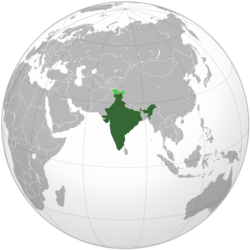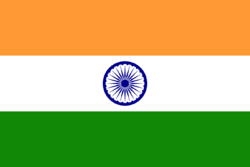India
 | |
 | |
| Capital city | Delhi |
| Location | South Asia, Asia |
| Leader | Prime Minister of India |
| Type | |
| Interest of | Thomas Malthus, OpIndia |
| Member of | BRICS, Commonwealth of Nations, G-20, Global Counter Terrorism Forum, Global Health Security Agenda, International Energy Agency, UN |
| Subpage | •India/Ambassador •India/Permanent Representative to the UN •India/Prime Minister |
| The "Jewel in the Crown" of the British Empire. Until independence in 1947 it was ruled from London under the auspices of a British-appointed Viceroy whose powers were absolute. | |
India is the most populous nation state in the world, after China.
Contents
Formation
| The Unmaking of India: How the British Impoverished the World’s Richest Country |
The UK colonized India in exchange for trading rights the English brought European products to India. Throughout the 1600s English trade in India expanded and English traders built many trading posts. and factories across India. However, by the end of the century relations with the Mughal rulers had worsened.[1]
In 1947, Mountbatten was appointed Viceroy and Governor-General of India and oversaw the Partition of India into India and Pakistan. Lord Mountbatten became convinced that the differences between the Muslim League and the Congress Party were irreconcilable in the 1900s, and that speed was of the essence because of the real risks of mutiny among Indian troops or the outbreak of civil war, and that a partition was the only expedient option to easy tensions, which became the official reasoning[2] Internal opportunity therefore led to the secret partition of India into India and Pakistan, along - often faulty - religious lines creating tensions for future generations between a much larger Hindu population and divided muslims.[3][4]
Military expenditure
In 2013, India was #9 in the world in terms of military expenditure.[5] Between 2012-2016, it was one of only 2 states to account for over 5% of global weapons imports (together with Saudi Arabia).[6]
"War on Terror"
- Full article:
 “War on Terror”
“War on Terror”
- Full article:
After the 2008 Mumbai attacks, the National Investigation Agency was set up, a special national "counter-terrorism" agency empowered to deal with "terror-related" matters anywhere in India without permission from the state governments.
Pollution
In 2015, the New York Times reported on Delhi's air pollution that "nearly half of the city’s 4.4 million schoolchildren have irreversible lung damage from the poisonous air."[7]
Cash
In 2016, the Indian central bank banned their highest denomination banknote, citing concerns about corruption.[8]
Hacking
In December 2018, the Indian government passed a law that required any person in charge of a computer to “extend all facilities and technical assistance to the agencies” in accessing its content. Failure to comply with the agencies could result in seven years of imprisonment and an unspecified fine.[9]
Universal surveillance
In 2010 India started scanning personal details like names, addresses, dates of birth, mobile numbers, and more, along with all 10 fingerprints and iris scans of its 1.3 billion citizens, into a centralized government database called Aadhaar to create a voluntary identity system. This was reportedly breached in January 2018.[10]
An event carried out
| Event | Location | Description |
|---|---|---|
| Evacuation from Afghanistan | Afghanistan | The evacuation of foreigners from Afghanistan, one of the largest airlifts in history |
Related Quotation
| Page | Quote | Author | Date |
|---|---|---|---|
| Jimmy Carter | ““Well, he might be escalating it but I think that precedes Trump,” he said. “The United States has been the dominant character in the whole world and now we’re not anymore. And we’re not going to be. Russia’s coming back and India and China are coming forward.”” | Jimmy Carter New York Times | 2017 |
Events
| Event | Description |
|---|---|
| "Indian rivers swollen with bodies" | To further the COVID-19 agenda, corporate media reported of Indian rivers overflowing with corpses, implied of people dead of Covid. |
| 2001 Indian Parliament attack | An attack that greatly increased tensions between India and Pakistan. |
| 2008 Mumbai attacks | An incident of "terrorism" used to introduce the Indian National Investigation Agency. The perpetrators may have connections to the CIA and deep state. |
| 2022 Russian invasion of Ukraine/Premature death | Premature deaths of mostly Russian businessman during and around when the Russian invasion commenced. There may be Ukrainian and others as well. As the list grows, it appears the men are being targeted in dozens of western countries as well. |
| Bofors Affair | A collective name for two deals in which the Swedish arms manufacturer Bofors was involved in, including smuggling and bribes. |
| Le Cercle/2006 (Delhi) | Unusually far from Europe and the US |
Groups Headquartered Here
| Group | Start | Description |
|---|---|---|
| Aligarh Muslim University | 1875 | Before 1939, faculty members and students supported an all-India nationalist movement but after 1939, the university came to be a center of the Pakistan Movement. |
| Central Bank of India | ||
| Gujarat University | 1949 | The largest and oldest university in Gujarat. |
| Himachal Pradesh University | 1970 | University in the former hill station of Shimla |
| Institute of Chemical Technology | 1933 | Has produced many first-generation entrepreneurs and academics. |
| Madras Christian College | 1837 | Indian college with many distinguished alumni |
| National Investigation Agency | 31 December 2008 | Indian "counter terrorism" government agency |
| National Law School of India University | 1986 | Considered the best law school in India |
| Panjab University | 1882 | one of the most well ranked universities in India |
| Reserve Bank of India | ||
| University of Delhi | 1922 | DU is one of the most sought after institutions of higher education in India |
Job here
| Event | Job | Appointed | End |
|---|---|---|---|
| Richard Deverall | Leader of the AFL's Far East Bureau in Japan | 1949 | 1955 |
Citizens of India on Wikispooks
| Title | Born | Died | Description |
|---|---|---|---|
| Montek Ahluwalia | Global Commission for Post-Pandemic Policy, G30 | ||
| Mukesh Ambani | 19 April 1957 | Asia's richest man living in the world's most expensive house. Selected a Global Leader for Tomorrow by the World Economic Forum in 1994. By the 2010s, he sat on the board of the same World Economic Forum. Member of the Global Board of Advisors of the US Council on Foreign Relations. | |
| Sayeed Zabiuddin Ansari | 30 November 1980 | Terrorist accused of being involved in the 2008 Mumbai attacks. | |
| Shiva Ayyadurai | 2 December 1963 | American biologist and dissident. | |
| Homi J. Bhabha | 30 October 1909 | 24 January 1966 | Indian nuclear physicist possibly killed by the CIA in air crash killing 117 |
| Pamella Bordes | 1961 | ||
| Raghav Chadha | 11 November 1988 | YGL 2022 who wrote a publicised letter to the Indian PM promoting the mandation of COVID jabs | |
| Morarji Desai | 29 February 1896 | 10 April 1995 | Prime Minister of India who was on the CIA payroll |
| Indira Gandhi | 19 November 1917 | 31 October 1984 | Le Cercle |
| Mahatma Gandhi | 2 October 1869 | 30 January 1948 | Indian non-violent revolutionary sage |
| Rahul Gandhi | 19 June 1970 | Part of the Nehru–Gandhi family. President of the Indian National Congress 2017-2019, but resigned as party leader after poor election results. | |
| Deepti Gurdasani | 1982 | British-Indian lecturer with links to the Wellcome Sanger Institute. She is a huge promoter of lockdowns and the Covid-19/Vaccine | |
| Cushrow Irani | 1931 | 2005 | Indian editor member of many Cold War press efforts. |
| Ajay Kalsi | Indian billionaire businessman | ||
| John Kapoor | 1942 | US billionaire found guilty of bribing doctors to prescribe opioids. | |
| Poonam Mahajan | 9 December 1980 | WEF YGL Indian politician who attended the Georgetown Leadership Seminar/2015. Father shot dead | |
| Vikram Mehta | Indian business executive turned analyst. | ||
| Aditya Mittal | 22 January 1976 | Indian billionaire heir to steel empire. WEF Young Global Leader 2005. | |
| Madhav Das Nalapat | 1950 | An academic and columnist from India | |
| Hardeep Singh Puri | 15 February 1952 | Indian diplomat with a belief in Western good intentions | |
| Lavanya Rajamani | 19 August 1973 | Indian professor and Rhodes Scholar | |
| Lila Rajiva | |||
| Arundhati Roy | 23 November 1961 | Left-wing writer/activist with many dangerous enemies | |
| Lal Bahadur Shastri | 2 October 1904 | 11 January 1966 | Indian Prime Minister possibly assassinated by the CIA. |
| Salil Shetty | 3 February 1961 | Multiple WEF AGMs and MSCs | |
| Vandana Shiva | 5 November 1952 | Anti-globalization and anti-GMO activist | |
| Danish Siddiqui | 19 May 1983 | 15 July 2021 | Indian photo-journalist killed the crossfire in Afghanistan in July 2021. |
| Manmohan Singh | 26 September 1932 | Le Cercle | |
| Rahul Singhvi | cofounder and CEO of the spooky biomanufacturing company National Resilience, Inc., which produced the mRNA for hundred of millions of Moderna Covid jabs | ||
| Devi Sridhar | 1984 | WEF Young Global Leader pushing SDS policy. In 2020, Devi Sridhar advised the Scottish government on how to deal with COVID in Scotland. Unflinching as to children. | |
| Arvind Subramanian | Indian economist who became the second Indian to attend the Bilderberg in 2023. | ||
| Soumya Swaminathan | 2 May 1959 | WHO chief scientist, interested in tuberculosis and HIV | |
| Ratan Tata | |||
| T. S. Tirumurti | 7 March 1962 | Indian diplomat | |
| Fareed Zakaria | 20 January 1964 | Newsweek Editor, first Indian Bilderberger, WEF AGM regular, WEF YGL 2005 ... |
Event Participated in
| Event | Start | End | Location(s) | Description |
|---|---|---|---|---|
| Bandung Conference | 1955 | 1955 | Indonesia | Important conference for the global south; participants soon became prime targets for US foreign policy |
References
- ↑ https://www.bbc.co.uk/bitesize/articles/zx8sf82
- ↑ https://www.itv.com/news/central/2022-08-12/what-was-partition-and-why-does-it-matter
- ↑ https://www.britannica.com/event/Partition-of-India
- ↑ https://thediplomat.com/2019/03/the-origins-of-hindu-muslim-conflict-in-south-asia/
- ↑ http://www.iiss.org/en/about%20us/press%20room/press%20releases/press%20releases/archive/2014-dd03/february-0abc/military-balance-2014-press-statement-52d7
- ↑ https://www.armscontrol.org/act/2017-03/news/us-leads-rising-global-arms-trade
- ↑ http://www.cryptogon.com/?p=46718
- ↑ http://www.nzherald.co.nz/business/news/article.cfm?c_id=3&objectid=11766817
- ↑ https://venturebeat.com/2018/12/21/indian-government-to-intercept-monitor-and-decrypt-citizens-computers/
- ↑ http://marginalrevolution.com/marginalrevolution/2018/01/security-breach-india.html